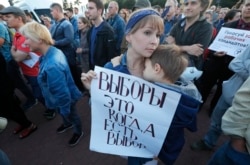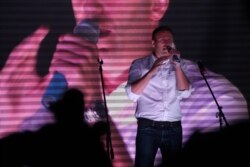Russian voters handed setbacks to Kremlin-affiliated candidates in Moscow and other local elections nationwide — losses that came despite a near total ban on opposition candidates that sparked a summer of street protests and mass arrests in the capital.
With most of the vote counted, returns showed pro-Kremlin candidates lost over a third of seats in the race for Moscow’s city council — suggesting a plan by the opposition to consolidate votes around targeted opponents of the Kremlin had been relatively successful.
Meanwhile, Kremlin-backed candidates appeared poised to hold on to the important governor posts in 16 regions, including Russia’s second capital, Saint Petersburg.
The independent election monitoring organization Golos reported “the mass use” of cash incentives and busing of voters to election precincts in Siberia and the Far East. It also complained of a lack of access by vote monitors and journalists to precincts.
Ella Pamfilova, the head of Russia’s Election Commission, who had been subject of a mysterious attack on the even of the vote, accused Golos of reproducing claims of fraud from previous elections.
The closely watched Moscow elections — which have been marred by past vote rigging —proceeded largely without incident. Several videos, however, circulated on social media showing ballot stuffing at a few polling stations.
Election Repression
For many, the vote was characterized by which candidates were not in the race.
Russia’s Election Commission banned the vast majority of opposition candidates alleging they did not have the required number of signatures to participate.
The move prompted a rolling series of street protests in Moscow and Saint Petersburg that saw some 2,500 arrests — effectively turning a somewhat minor race into a test of political freedoms in President Vladimir Putin’s managed democracy.
Banned opposition candidates spent much of the summer in prison. A handful of protesters faced even harsher punishment — several receiving prison terms of 3-5 years for participating in what the government says are “unauthorized rallies.”
Yet Russian President Vladimir Putin dismissed complaints about the lack of competition.
“It’s not important how many candidates there are — what matters is the quality,” said the Russian leader as he cast his vote in Moscow.
Putin has said Russians have the right to protest but has also warned that authorities would not tolerate those who break exiting laws.
In a reminder of that threat, a dozen demonstrators were arrested in Moscow Sunday while trying to raise public awareness over the harsh sentences issued by Russian courts earlier in the week.
Where is the Party of Power?
The vote seemed to confirm recent polls that showed a collapse in support for the government and its ruling United Russia party.
Indeed, United Russia — formally, still the ‘party of power’ in Russia’s Parliament — was nearly absent from the ballot as party regulars recast themselves as ‘independents’ to avoid voters’ ire.
Yet they faced another challenge.
With opposition candidates barred from participation, Russian opposition leader Alexey Navalny called on voters to avoid diving their votes and embrace a ‘smart voting’ strategy. The plan amounted to outing Kremlin-affiliated candidates and urging voters to strategically cast their ballots for whatever other candidate has the best chance of winning.
I’ll vote for whatever smart vote candidate Navalny tells me to,” said Sergey Shepetev, 38, who spoke to VOA at outside a precinct in central Moscow.
“I don’t even remember his name. But I’ll vote for him. Anything to beat United Russia.”
Still, Navalny’s plan clearly tested the limits of opposition voters loyalty — in effect asking them to support candidates with ideas they clearly despised.
“I went and Smart Voted. What could be more repulsive?” asked Konstantin Sonin, a leading Russian economist, in a post to Facebook where he detailed his vote for a communist candidate.
“Voting for him, I voted “against all” — against everyone who ruined the Moscow elections.”
Election interference
The election was also characterized by accusations of foreign interference.
In advance of the vote, Russia’s Duma held investigations accusing the US and several media companies of trying to foment a street revolution.
On Sunday, Roskomnadzor, Russia’s Internet governing body, made similar “election interference” charges against American tech giants Google and Facebook, saying the companies had run online political ads banned on election day.
Yet the biggest factor in the race appeared to be low voter turnout — which hovered in the upper teens across the country and just over 20% in the capital.
“What elections? I have to work,” grumbled a cashier in Moscow when asked about the elections.
“I couldn’t vote if I wanted to.”







